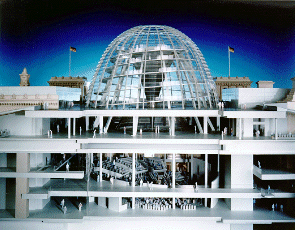The conversion - looking to the future
Preserving the old - giving shape to the new
On 16 June 1994, Sir Norman Foster presented a revised draft of his Reichstag project, based on three fundamental objectives:
- to meet the needs of a well-functioning Parliament;
- to respect the history of the Reichstag Building; and
- to imlement an innovative and forward-looking energy management concept.
The Reichstag Building is to be converted to meet all the requirements of a modern Parliament as regards state-of-the-art communication, office and workplace technology. At the same time, elements of the original structures designed by Paul Wallot are to be uncovered and preserved. In consultation with the Office for the Preservation of Historic Monuments, it has been decided, to this end, to remove the sections of the interior installed during the 1960s.
A landmark for the "heart of the Republic"
The Reichstag Building will once again by topped by a dome, not in its original historical form but as an form but as an expression of late 20th century architecture. The dome will perform three functions. Firstly, it will incorporate a visitor’s platform providing a panoramic view over the city. Secondly, within its glass and steel structure the dome will house a cone-shaped element designed to provide the plenary chamber below with natural lighting and ventilation. Thirdly, the transparent dome, lit up from within at night, will give Berlin as the capital of Germany a new landmark. The dome, with its modern design, will be a clear signal that the Reichstag Building has become the seat of the German Bundestag - and thus the "heart of the Republic".
|
Model of the dome |

